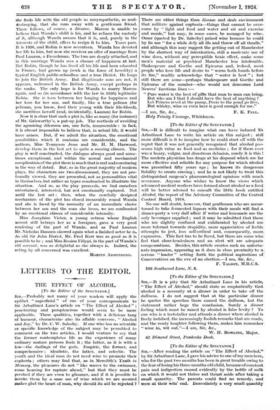LETTERS TO THE EDITOR.
THE EFFECT OF ALCOHOL.
[To the Editor of the SPECTATOR.] Sue—Probably not many of your readers will apply the epithet " superficial " of one of your correspondents to Sir Arbuthnot Lane's article on " The Effect of Alcohol " ; penetrating and perspicacious would seem to be more applicable. These qualities, together with a delicious tang of humour, characterize also its affable converse, " Alcohol and Joy," by Dr. C. W. Saleeby. If one who has no scientific or specific knowledge of the subject may be permitted to comment on the two articles, I would venture to say that the former contemplates life as the experience of many ordinary mature persons finds it ; the latter, as it is with a few—the darlings of the gods. Empiric, the former, and comprehensive ; idealistic, the latter, and eclectic. The youth and the ideal man do not need wine to promote their euphoria ; others may find that, as in Meredith's Youth in Memory, the pleasures do not " like waves to the swimmer, come heaving for rapture ahead," but that they must be invoiced if they are even to glimmer, and if it is possible to invoke them by a sane use of wine which we are assured makes glad the heart of man, why should its aid be rejected ? There are other things than disease and drab environment that militate against euphoria—things that cannot be over- come by " light and food and water and air and exercise and music," but may, in some cases, be assuaged by wine. Omar (quoted by Dr. Saleeby) prized wine because he could by its use " for a while defy all ills and throw off all thralls," and although this may suggest the getting out of Manchester by the shortest way of intoxication, still a moderate use of wine does, without any perceptible toxic effect, make some men's material or psychical Manchester less intolerable. Shakespeare and Goethe and Epicurus and, indeed, most people who love life and desire to " warm 'both hands before its fire," readily acknowledge that " water is best " ; but still there are some—perhaps Shakespeare and Goethe and Epicurus of the number—who would not denounce Lord Neaves' facetious lines " Pure water is the best of gifts that man to man can bring. But who am I that I should have the best of anything ? Let Princes revel at the pump, Peers to the pond go free, But whisky, wine or even beer is good enough for me."
Holy Trinity Vicarage, Whitehaven.










































 Previous page
Previous page